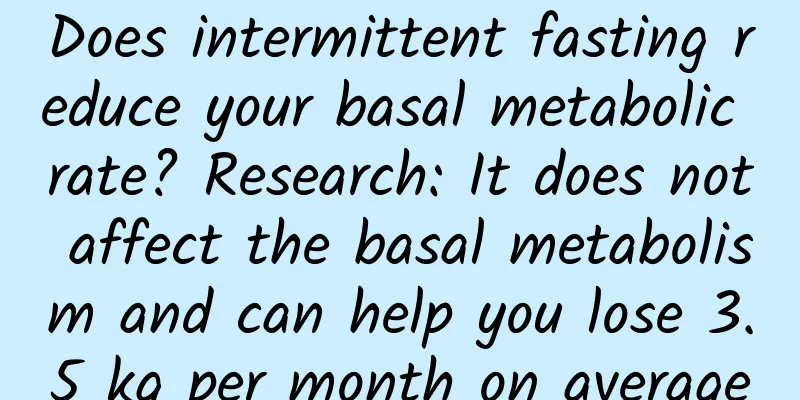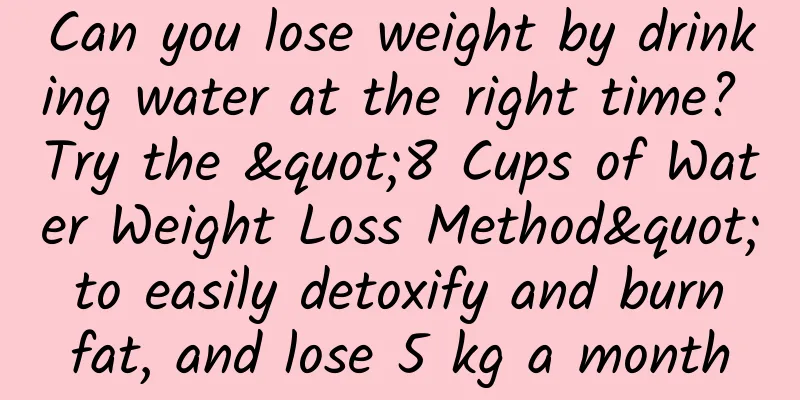Does intermittent fasting reduce your basal metabolic rate? Research: It does not affect the basal metabolism and can help you lose 3.5 kg per month on average

|
According to many scientific arguments, there is no need to carefully calculate the basal metabolic rate to lose weight. Intermittent fasting will not cause the basal metabolic rate to decrease, and it will have a positive effect on weight loss. I don’t know when it started, but “eating to your basal metabolic rate” became the iron rule for weight loss. When I look at the discussion forums of some weight loss groups on the Internet, if someone shares their weight loss story, there will almost always be someone commenting and asking, "Did you reach your basal metabolism?" In addition, I have produced many articles and videos on fasting, and readers often ask, "Should I pay attention to calories when fasting? What if I don't reach my basal metabolism?" Alternate-day fasting helps you lose weight In this article, we are going to dispel this myth. In fact, you don’t have to worry about your basal metabolic rate at all. Let's take a look at a study published in 2019. Austrian scholars recruited 30 subjects to do "alternate-day fasting" for one month, that is, one day they could eat and the next day they could not eat at all. Although such an extreme fasting method sounds hellish, it was found that there were no side effects in healthy people. After one month, the subjects lost an average of 3.5 kg in weight, but their basal metabolic rate had hardly changed! (Photo provided by Sancai Culture) According to the above research, that is to say, in the next month, even if you only eat half of the days, and drink water and eat nothing on the other half of the days, you don’t have to worry about fasting affecting your basal metabolic rate, and you can still lose weight! (I strongly suspect that the subjects were not completely obedient, otherwise the weight loss should not be only 3.5 kg.) By integrating existing fasting research, scientists have found that the weight loss effect of intermittent fasting is similar to that of traditional dieting. Choose a few days of fasting in a week. Even if the calorie intake does not reach the basal metabolic rate, the weight loss effect is similar to eating less every day but still reaching the basal metabolic rate. The idea that you need to eat your basal metabolic rate every day has no scientific basis. In fact, I searched using English keywords and could not find any academic or popular information at all. When you eat less, your body will naturally reduce your basal metabolic rate. "Eating to your basal metabolic rate" is a concept proposed by several internet celebrities in the past few years. The logic is that when the calories consumed are less than the basal metabolic value, the body will not be able to maintain normal physiological functions and will therefore enter energy-saving mode. On the contrary, if you eat less calories but not less than your basal calories, the energy-saving mode will not be turned on. This theory sounds reasonable at first, but the human body does not work so black and white. Energy saving mode is not a switch, but more like a volume knob. For example, some people like to open many windows at a time when using a computer, one window for watching movies, one for listening to music, one for using communication software, and another for opening Word to do homework. As we open more and more applications, the computer's processing speed becomes slower and slower, but the so-called "slow mode" does not appear when a certain number of windows are opened. In the same way, our bodies detect the total amount of caloric intake over several days. When this value decreases, the basal metabolic rate and activity energy consumption will decrease accordingly. The less you eat, the more your metabolism will drop. You won't officially enter "energy-saving mode" just because your metabolism is below your basal metabolism on a certain day. So, is there a way to lose 20 kilograms while maintaining a high metabolic rate? I can say with certainty that this cannot be done. The lighter you are, the lower your metabolism must be. Would the fuel consumption of a 5-ton truck be the same as that of a Yaris? My advice to those who are trying to lose weight is this: whether you want to eat less every day or choose not to eat at all for one or two days a week, don’t worry about whether you are reaching your basal metabolism. First, the basal metabolic rate requires laboratory-grade equipment to be accurately measured. Although various body fat meters on the market "claim" to be able to measure it, their accuracy is often terrible. Second, the basal metabolic rate has no special value for weight loss, so there is no need to be too fussy about calorie intake for it. Dr. Scott's 1-minute reminder Whether you eat less calories every day or adopt intermittent fasting, you don't have to worry about the basal metabolic rate. You can lose weight successfully whether you eat your basal metabolic rate or not. This article is selected from Sancai Culture's "One-Minute Weight Loss Classroom 2 Dr. Scott's Scientific Guide to Muscle Gain and Fat Loss: The Latest Scientific Research X Seconds to Understand Chart Analysis, Debunking 41 Weight Loss Myths! 》 |
Recommend
What medicine can cure endometrial tuberculosis?
Endometrial tuberculosis is a disease that can af...
Do birth control pills cause menstrual irregularities?
Will birth control pills cause irregular menstrua...
Correctly understand the difference between vulvar white lesions and vulvar leukoplakia
Do you know the difference between vulvar white l...
What are the causes of irregular menstruation?
Many women suffer from irregular menstruation, bu...
My period just ended, my vulva is itchy, and the leucorrhea is fine. What's wrong?
My period just ended, but my vulva is itchy and t...
What are the treatments for chronic cervicitis in women? Analysis of immunotherapy for chronic cervicitis in women
There are many factors that cause women's dis...
Can women still have sex after menopause?
Women can still have sex after menopause, but as ...
Physical health care for menopausal women
Experts say that menopause is a common gynecologi...
The main factors for uterine fibroids
Uterine fibroids are a relatively serious gynecol...
What medicine is good for chocolate cyst
What medicine is good for chocolate cyst? Many pe...
How long do you need to rest after a miscarriage?
How long do I need to rest after a miscarriage? M...
What are the precautions for pelvic inflammatory disease
Pelvic inflammatory disease is a common gynecolog...
What is the method of examination for congenital absence of vagina?
How to check for congenital absence of vagina in ...
What should I do if my menstruation is irregular and my uterus is not fully developed?
What should I do if my menstruation is irregular ...
When cholesterol rises, these three parts of seafood are landmines! Nutritionist: Boiled mushrooms help lower cholesterol and prevent cancer
"My health check report shows high cholester...









